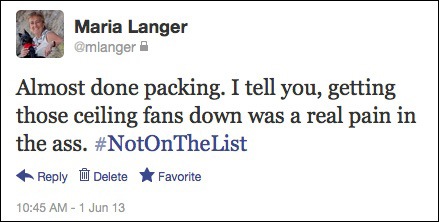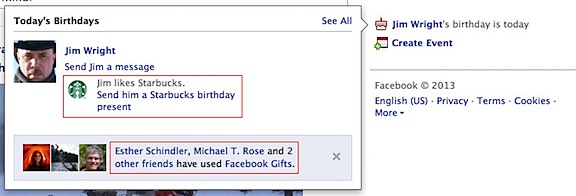It does serve a real purpose.
The other day, one of my Twitter/Facebook friends linked to an article in the New York Times titled “How Not to Be Alone.” In his words, it was “highly recommended.” So I read it.
The piece started out with a story about seeing a 15-year-old girl crying into a cell phone during a discussion with her mother. The story went on for four paragraphs, with the author, Jonathan Safran Foer, using his fifth paragraph to discuss his moral dilemma: talk to this stranger to try to comfort her or “respect the boundaries” between them. He never does say what he chose to do.
From there, the article launches into a discussion of how modern day methods of communication are dividing us, weakening our relationships, reducing our ability to articulately communicate, and making it easier to “avoid the emotional work of being present” to communicate. He argues that by diminishing our communication with others, we diminish ourselves.
He says:
We often use technology to save time, but increasingly, it either takes the saved time along with it, or makes the saved time less present, intimate and rich. I worry that the closer the world gets to our fingertips, the further it gets from our hearts. It’s not an either/or — being “anti-technology” is perhaps the only thing more foolish than being unquestioningly “pro-technology” — but a question of balance that our lives hang upon.
I read through the article twice without coming away with a one-line summary of what he was trying to say. Apparently, I wasn’t the only one having trouble with it because another Twitter friend replied to me and someone else with the simple — thank you, Twitter! — summary:
Don’t write when you can call. Don’t call when you can visit.
Simple enough. And I can certainly agree.
But it got me thinking about text messaging and the way it seemed to be painted, in the Times piece, as something that’s destroying society. And that bugged me.
Because I just don’t think it’s true.
Text Messaging for Work
You see, I use text messaging extensively for work. It gives me the ability to communicate instantly with clients and colleagues about things that they might want to know about right now. The key word there is might. If they must know about it now, I call their cell phone. But why bother them with a call when they might or might not be interested with the information I have to share? Or if I need an answer to a question but I don’t need it immediately — and know I will likely forget to ask if I do make a call later?
Here’s an example. My summer work requires me to be on call to fly over cherry orchards after it rains. The other day, there was rain in the area. I watched it move through on radar on my iPad. I saw it approaching an area where one of my clients has an orchard. I know he doesn’t live near there. I wanted to make sure he knew I was monitoring the weather and had some concerns about his orchard. So I texted:
Do you have someone at Malaga?
That was at 4:30 PM. His response came at 5:34 PM, after the weather had moved through:
Yeah. We made it through another close afternoon.
Communication accomplished. I didn’t have to call him to pester him with my question. He’s been growing cherries a lot longer than I’ve been drying them with a helicopter. I’m sure he had a handle on it. But by sending that quick text message, I communicated that I was aware of the situation and would be ready if he needed me. The fact that he didn’t respond for over an hour was okay with me. For all I know, he might not have even looked at his phone for an hour. He might have been busy watching the weather.
Do I communicate by text with all of my clients? No. Only the ones who have shown that they use text messaging to communicate by texting me first. When a client texts me, he’s telling me that texting is an acceptable or maybe even preferred means of communication. I’m okay with that.
I’m Not Alone
The title of the piece suggests that modern communication is making us more alone. I disagree wholeheartedly. If anything, text messaging has brought me closer to friends.
This morning, for example, while I was still in bed at 4:15 AM, I texted a friend on the east coast — where it was 7:15 — with a question. If he saw it immediately, great. If not, that was okay, too. He’d eventually see it and respond. But he was there at his desk and we had a text “conversation” about a bunch of things.
You might argue that when I realized he was available I should have picked up the phone and called him. But my friend works from home and uses his phone extensively for work. Chances are, our conversation would have been interrupted one or more times by incoming phone calls. Was our texted conversation important enough to disrupt his work day? No.
Although texting suggests a sort of immediacy to the conversation, it also makes it possible to put down and resume a conversation over time. Indeed, I’ve had texted “conversations” with people that have gone on for hours or days or even weeks. Could I accomplish this with phone calls? No — not without becoming a nuisance.
I can’t tell you how many friendships — including very old friendships — I have been able to maintain via text messaging and email. Sometimes it’s the best option.
The Trouble with Phone Calls
The problem with using the phone is that when you call someone, you’re saying, in effect, that it’s okay for you to bother him/her when it’s convenient for you. After all, you don’t usually call someone when it isn’t convenient for you, do you?
Of course, you can always schedule a phone call. Some of my publishing contacts do that. It makes sense. Take a meeting, on the phone.
But calling out of the blue? When someone might be busy? Just to chat?
I guess it depends on the kind of relationship you have with that person. I have plenty of friends who I feel comfortable calling to chat — at certain times of the day or evening. But if I don’t know a person very well, I think it’s rude to bother him/her with a phone call just to say hello.
Is that making me more alone? Not when I can fire off a quick text that might lead to a phone call when it’s convenient for both of us. Indeed, sometimes I’ll send a text message that says,
Are you around? Okay if I call?
Even if I don’t get a response, I get an answer to those questions: No.
Of course, this is assuming the person I want to reach lives with his/her cellphone at arm’s length all day every day. But that’s the kind of people I’m most likely to text anyway.
I’m not texting my mother or sister or a friend who keeps his cell phone packed away in a little backpack he uses as a manly man purse. (You know who you are!) I’m just texting the same people who text me.
In Person Meetings
When I was a kid, I’d go to my Aunt’s house in a nearby town. It aways amazed me how we’d be sitting around in the kitchen — the focal point for any Italian-American household — and one of her neighbors would walk right in. Often without even knocking on the door!
I’d love to live somewhere with all my friends nearby and be able to keep my doors unlocked at all times so they could walk right in and visit me. But that’s not my reality these days. Is it yours?
My world is bigger — my friends can be found all over the globe. They’ve chosen to live where they live just as I’ve chosen to live where I live. That doesn’t mean I won’t have super friendly neighbors when I finally build my new home. But I don’t really expect anyone to just “drop in” like we did in the old days.
Does that make me alone? I don’t think so. It makes me more likely to get out and about to get the social interaction I need with a wider variety of people in a wider variety of places.
So rather than sit around the kitchen table and wait for the same handful of visitors my Aunt’s family got, I’m getting out and expanding my world.
In Defense of Text Messaging
I’m not a kid. I’m in my 50s.
When I was a kid, we had three options for communication: face to face, telephone (which could be expensive if calling out of your immediate area), and mail (which took 2-3 days each way).
Today, we still have all of these things. Telephone use has become cheaper, mail has become more expensive. But we also have several free (or arguably low-cost) means of communication: fax (which is now, thankfully, almost dead), email, text messaging, and video conferencing. (And don’t get me started on self-publishing options — like social networking, blogging, print on demand, and ebooks — that make communication to the masses amazingly easy and cost effective.)
I can now communicate instantly for next to nothing with my friends and colleagues all over the world. I couldn’t do that when I was a kid.
I don’t understand how someone can argue that having and using more methods of communication — especially instantaneous, real-time methods — makes us more alone. If anything, it helps us connect better.
And text messaging is just one tool for doing that.
Your thoughts? Put ’em in comments so we can discuss.






 I read an interesting essay on the New Yorker magazine’s website yesterday: “
I read an interesting essay on the New Yorker magazine’s website yesterday: “

